This Research Insight explores how rent control impacts the rental market as housing affordability remains a concern for many Canadians. Rent control laws, which limit annual rent increases, have grown in prominence since COVID. While they help current tenants with lower rents, they can lead to trade-offs like higher rents for vacant units, fewer rental options and reduced residential mobility. Rent control can also reduce housing quality and the value of controlled properties.
Key insights include:
- Lower rents for current tenants: Rent control helps prevent steep rent increases for existing renters.
- Higher rents for vacant units: Rent control can accelerate rent increases for new or vacant units.
- Reduced housing supply and mobility: Fewer rental options and lower residential mobility are common effects.
- Regional differences:
- Quebec maintains better affordability with new rental construction in part through unique regulations.
- Alberta, with no rent control, keeps rents affordable by incentivizing more rental supply.
The Research Insight also reviews 26 economic, social and demographic effects of rent control, highlighting its benefits and trade-offs.
- Author:
- CMHC
- Document Type:
- Date Published:
- August 13, 2025







 Share via Email
Share via Email
